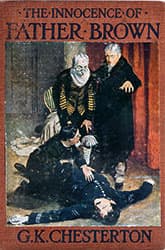The Blue Cross
Critique • Quotes
 First edition of story collection
First edition of story collectionFirst publication
The Saturday Evening Post, 1910, as "Valentin Follows a Curious Trail"
First book publication
In The Innocence of Father Brown collection, 1911
Literature form
Story
Genres
Crime, mystery
Writing language
English
Author's country
England
Length
approx. 7,500 words
The magical appearance of Father Brown
G.K. Chesterton pulls off an amazing trick of literary misdirection in "The Blue Cross".
This, of course, is the story that in its opening lines introduces readers to that great detective—the most famous investigator in the world on his greatest case—the one and only...Aristide Valentin?
You were expecting someone else?
Father Brown isn't mentioned for most of "The Blue Cross". Renowned French inspector Valentin follows a series of clues in pursuit of Hercule Flambeau, the most famous criminal of his time, who is intent of stealing an invaluable religious artefact.
A trail of rather strange clues really. They don't make any sense. But they keep intriguing Valentin—and readers—to draw us on. How is the celebrated detective going to pull all the clues together to deduce a rational conclusion? We anticipate a Sherlock Holmes-style revelation making sense of it all and solving the case.
But little do we know while we've been distracted by the building suspense of the chase that a certain little priest has had the case well in hand all along.
Bowing to the bumpkin
About two-thirds of the way through the story, Father Brown is revealed as the protector of the cross. Even then he presents as a mystifyingly underwhelming figure, a "bumpkin" as Flambeau calls him. Surely no match for the wily thief.
But by the story's conclusion, both the great detective and the infamous thief pay tribute to the little religious figure, acknowledging their master in the art of detection.
In more than fifty stories after "The Blue Cross", Father Brown carries on solving mysteries. Valentin sticks around for only a few more stories as a secondary character before Chesterton has him killed off.
Flambeau has a longer literary life than Valentin, appearing as a criminal in several stories and then reforming to become a detective himself in further Father Brown mysteries. (By the way, you may have noticed his first name is identical to that of Agatha Christie's best-known detective. Was Hercule Poirot inspired by Chesterton's character?)
"The Blue Cross" offers a round-about introduction of one of the most popular fictional detectives ever created. It's interesting to note how often other famous sleuths are presented indirectly, seen through others' eyes. It's a narrating Doctor Watson who describes meeting Holmes in A Study in Scarlet (1887) and who remains the chronicler of the detective's adventures. In the most famous of Arthur Conan Doyle's novels, The Hound of the Baskervilles (1902), Holmes is seemingly out of the picture for much of the tale.
Christie's Poirot is brought into his first fictional mystery, The Mysterious Affair at Styles (1920), by his friend Captain Hastings and makes his biggest breakthrough with the reading public in The Murder of Roger Ackroyd (1926), a novel narrated by a previously unknown character, hiding Poirot until about a third of the way in.
Secondhand presentations serve to keep our classic heroes at a distance and impart an air of mystery to their work. Authors in these cases don't have to expend much energy in detailing their sleuths' backgrounds, nor reveal their every thought until the cases are surprisingly resolved at the end.
For all we gather of Father Brown's intelligence and perceptiveness, we learn very little about his personal life. We don't know his back story, his family, his career, his home life, or how he manages to show up at all the crime scenes. We're not even sure of his Christian (pun intended) name.
Far-fetched mysteries
However, Chesterton uses the stories to make subtle points about the priest's down-to-earth religious views. In "The Blue Cross", for example, Father Brown's success in foiling Flambeau is partly attributable to his acceptance of rationality as the basis of theology. This trips up the criminal who assumes, like many of us, that faith such as Father Brown's must run counter to rationality.
Such little nuggets of religious philosophy are not as annoying as you might expect. If anything they serve to add weight to stories that are—let's be honest—rather far-fetched.
The plot of "The Blue Cross" is dependent on a whole string of effects to come off exactly as intended. A single minor character not acting or speaking exactly as Father Brown expects them to react to bizarre events would bring the chase to a halt. Offsetting performances and sleight-of-hand by both Brown and Flambeau must come off perfectly.
But the job of the writer in this genre is to distract us from the implausibilities and keep us riding the narrative to the satisfying resolution. A great trick when it works. As it does in "The Blue Cross".
— Eric
Critique • Quotes

